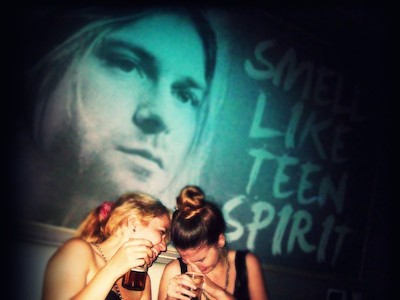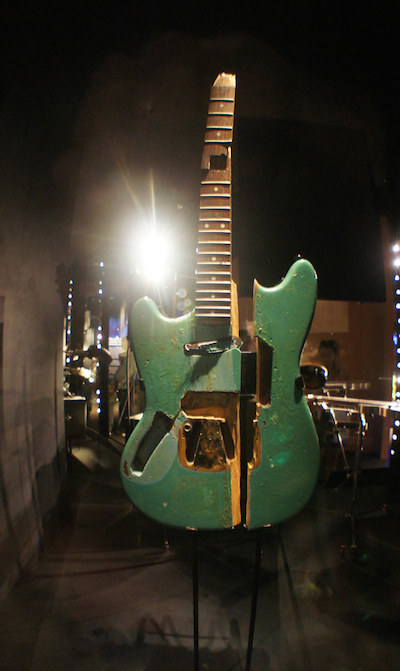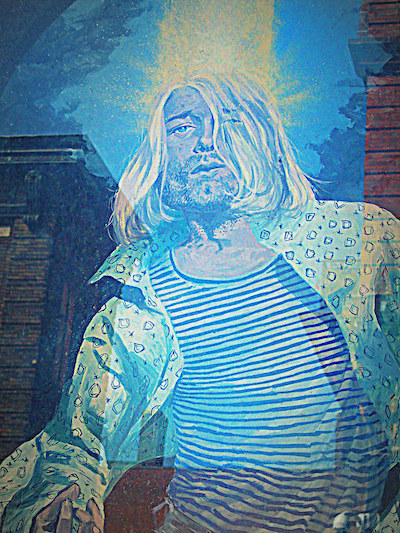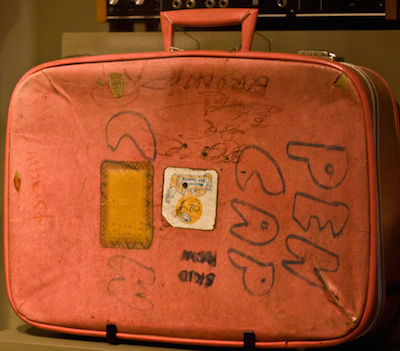The other night I was down in the basement mopping an area of the floor where the cat had created an unauthorized extension of his litter box and wondering if it was too late to give up cats and mopping for Lent. I had my iPod with me to pass the time and had it set to shuffle since I wasn’t in the mood for anything in particular (other than strangling the cat). Thankfully, it wasn’t long before the music soothed the savage intentions I harbored toward my little feline beast. Tom Petty morphed into Palestrina then into The Corrs, Paul Simon, Altan, and finally Nirvana. I couldn’t remember the last time I’d heard “Smells Like Teen Spirit.”

My friend Evan gave me Nevermind for my birthday in 1992–twenty years ago (!) last month. I can still remember vividly the moment he handed me the cassette, unwrapped, in the parking lot of the store where he bought it. Nirvana never supplanted R.E.M, Iron Maiden, or Metallica as the lords of my high school tape deck, but “Smells Like Teen Spirit” became the anthem of the day.
For a few moments, as the song roared through my earbuds and I finished swabbing the floor, it seemed as if it were 1992 again. But this time around, it wasn’t the paradigm of popular music that Nirvana rocked; it was the trajectory of my 2012 journey through Lent.
Lent has been a little…”blah” for me this year. I never really gave up what I said I’d give up, and while I’ve preached some good sermons and led some meaningful worship services, I feel like I’ve been going through the motions more than anything. Spiritually, the season has been disconcertingly routine, like spending spring break doing homework. The air in my soul has seemed humid, stagnant, lethargic.

Then “Smells Like Teen Spirit” hit me like a thunderstorm. I felt simultaneously refreshed and in need of shelter:
With the lights out, it’s less dangerous
Here we are, now, entertain us!
I feel stupid, and contagious
Here we are, now, entertain us!
Maybe it was the Pine-Sol getting to me, but as I listened I could almost see the song more than I could hear it. And what I saw in this chorus was the vanishing point for everything that Lent calls us to confront: the facts and features of life–especially 21st century life–with which we need to wrestle if this holy season is to be what it ought to be: the roots of our cultural obsession with vampires; the bizarre appeal of “Slacker” wear and “I’m too pretty to do homework” merchandise; the socially acceptable deception of airbrushed magazine covers; the willful deafness created by ideological and political echo chambers; in short, our individual and collective fondness for low light (in all its forms) that Cobain and company proclaim if not celebrate.
There was a time when darkness was an element we feared. No longer. Not only do we not fear it, but living “with the lights out” now seems to be a state we prefer because we find it “less dangerous.” Light exposes details, bids us to look closely, and–especially when we’re looking in the mirror–compels us to see clearly things we’d rather not see. Shadows provide a haven from all that. And although we certainly are not the first people in human history averse to critique and self-examination–or even the first to choose ignorance as a means of finding bliss–modern technology allows us to conceal ourselves without the annoyance of also disconnecting ourselves. In our digital universe, we can project ourselves as we choose and filter information as we choose so that, if we choose, we can live inside a thoroughly comfortable and customized feedback loop. Yet we still crave excitement, so we end up incessantly surfing this benign and ultra-personalized virtual reality for something bigger, brighter, and edgier.
Here we are now, entertain us!

Christians (including pastors) have embraced the shadows as much as anyone. Like Nicodemus, we seek Jesus under the cover of darkness, not wanting our questions overheard or our presence noticed by certain people. We arrive for worship five minutes late and leave five minutes early. We evaluate the sermons we hear based on how well they confirm what we already believe, and we assess the sermons we give based on the number of compliments we receive. We stitch our theologies together from easy-to-repeat platitudes and prefer to do our evangelism via bumper sticker. Like so much else in life, we view the gospel as something for us to consume rather than something that should consume us.
The good news is that Jesus will meet us in the dark–just as He met Nicodemus. He didn’t shew Nicodemus away and tell him to come back in the morning. But He also wouldn’t let Nicodemus hide in the shadows or behind ingratiating pleasantries. Jesus will not allow us to hide there, either. “For all who do evil hate the light and do not come to the light, so that their deeds may not be exposed. But those who do what is true come to the light, so that it may be clearly seen that their deeds have been done in God.” (John 3.20-21). It is perhaps inevitable that no matter how much we, the people of Jesus, try to be “in the world but not of the world,” our faith is invariably shaped by the culture we inhabit. Nevertheless, Christ calls us to make the world brighter, not dimmer, regardless of how much we may like the ambiance of a particular age.
“Like so much else in life, we view the gospel as something for us to consume rather than something that should consume us.”
In the end, that’s what Lent is: a coming to the light, a realization that darkness itself is what Jesus calls us to confront. We prefer to focus our spiritual energies on itemizing, critiquing, and condemning certain things that go on in the dark, because we can do that from the safety of our own shadows. The light makes us wince in no small part because entering the light means surrendering the slice of shade we’d rather reserve for ourselves.

And so on this Good Friday, I find myself standing at the foot of the cross with Nirvana blaring in my ears and a question staring me in the face. Will I stop here? Will I remain in the shadow of the cross? Or will I pick up my own cross and follow Jesus through it–into the light?
There’s only one way to get to Easter.































